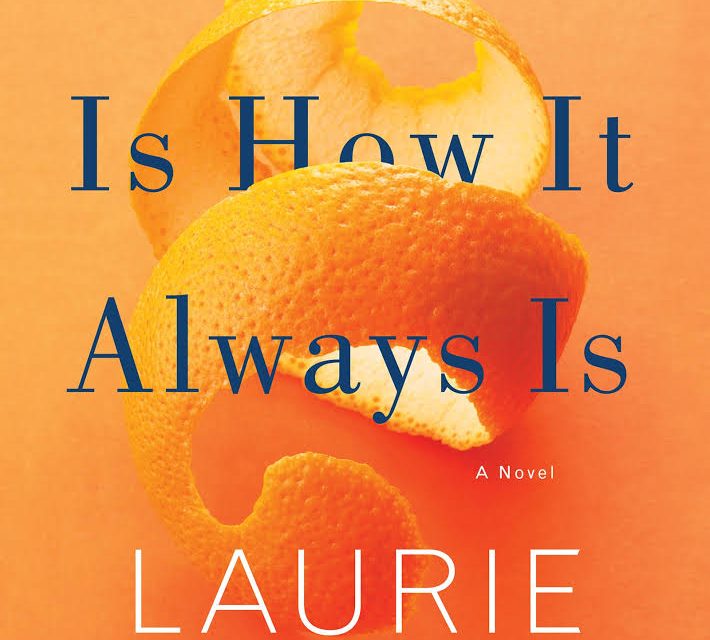I am a huge fan of reading fiction, not only for the pleasure factor, which is high for me, but also because of the way fiction has formed and continues to form my moral imagination. Through the encounter with characters and their stories, my heart is stretched and I feel I often walk away from a great book with a profound experiential knowledge—a connatural knowledge—of moral and theological truths, a knowledge that is emotional but something more significant than a mere feeling. I had this experience recently with Laurie Frankel’s This is How it Always Is.
This is the story of a family coming to terms with and learning how to deal with the practical realities of their son wanting to become—or realizing he is—a girl. Claude is the youngest of five boys, a quiet, serious, highly precocious baby and toddler. In the year before kindergarten, he gets obsessed with a dress-up gown that he wears constantly, though not usually in public. His parents accept this without much thought. Any parent can tell you of the obsessions and fetishes of our preschoolers. But Claude begins to want to wear the dress outside, to preschool. He begins drawing himself in dresses and heals. By the time kindergarten starts, Claude is convinced that he wants nothing more than to dress as a girl, which he begins to do after the first semester of his kindergarten year.
Claude is treated immediately as a transgender child. He gets to go to the bathroom in the nurse’s office. His kindergarten class is briefed and is, generally accepting. The school insists on a name change. But eventually the family ends up moving across country in response to some people’s intolerance. In the process, they inadvertently give Claude—now Poppy—a new start. They don’t tell most people that Poppy was once a boy. They let his classmates and teachers assume he is a girl. And Poppy truly is a new person. She is confident and talented, where Claude was clumsy and withdrawn. She is popular, where Claude had no friends. And for several years the family is happy.
Trouble begins in fifth grade with the debate about what to do with Poppy’s upcoming entry into puberty. Should she be given suppressing hormones to block the emergence of testosterone and effectively keep her a little girl? Should she be given a choice to return to being Claude as she experiences her surging male biology over the course of puberty? Should she have surgery? Though both parents are accepting of Poppy, indeed, they love her as the daughter they had long wished for, they are in disagreement about how she should proceed in being Poppy when she is no longer a little girl. And then Poppy’s classmates find out that she was once, or still is, a he and Poppy undergoes a literal existential crisis that few ten year olds are equipped to deal with.
This book is not overtly political. It is not about transgender bathrooms or about transgender people serving in the military, though issues like these are touched on. Nor is this book a sermon about how transgender people can be better incorporated into society. And, though Frankel did raise a transgender child, this is not a memoir or personal narrative. It is a novel. It is a story that offers us a set of characters and series of circumstances that many of us, me included, have not encountered in our real life and might never encounter in our real life. And the novel’s intent is to instruct the heart.
Through the encounter with Poppy’s story, we get to walk alongside a family that is asked to love in a way that is deeply challenging, and in the process, we are formed in that love. As a parent, I could not help imagining how I would react to my son’s request to wear a dress to school, his need to grow his hair long, his need to no longer be my little boy. And my heart was attracted to the unconditional love the parents show, even when dealing with horribly complicated logistics that admitted no easy solution. My heart was attracted to the hospitality of the family in welcoming Poppy as they would welcome any child. And I could feel my heart beginning to be formed in these virtues of unconditional love and hospitality, certainly not ready, but better-equipped to re-enter the real world where this is a real problem, if not in my own family, certainly in my community.
And so even though this book is not overtly political, it is still political. The arts instruct the heart in a way that is integral to citizenship. The stories we tell help form us directly into the people, and the citizens that we will become. I do not have good answers after reading this book about how transgender people should serve in the military. If anything, I better understand how complicated this question really is. I don’t have good answers about which bathrooms transgender people should use, or whether health insurance should pay for surgery for transgender people. But I do feel better equipped to respond with love and hospitality to my transgender neighbor. And if we will ever, as a society, come to reasonable answers to the practical questions that the transgender issue raises, these are virtues all of us will need to have. Which is why you also should read this book.




